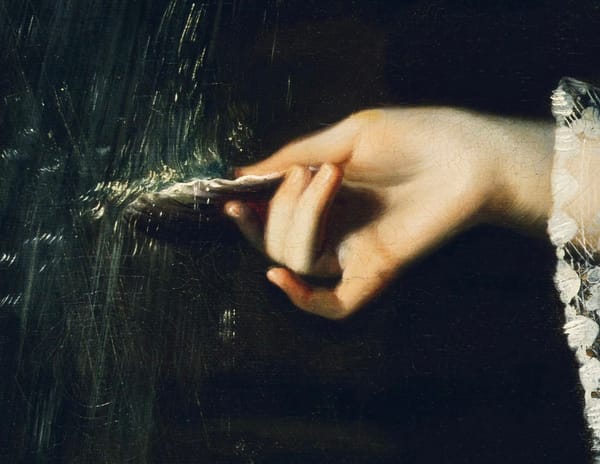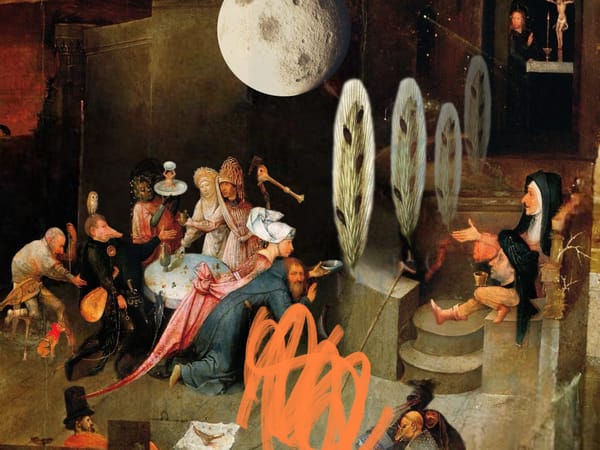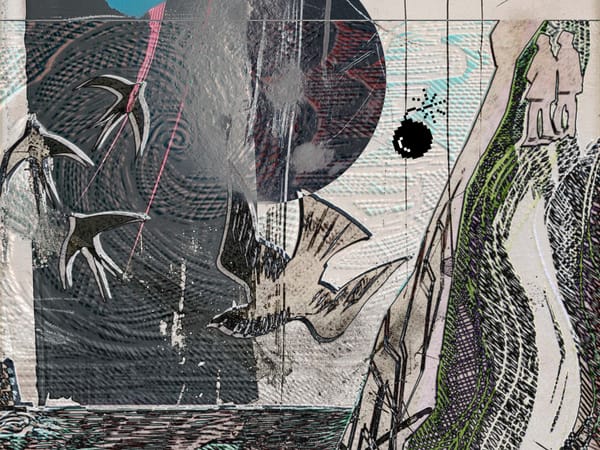I GRATIFY MY MALICE THROUGH QUIET NEUTRALITY
Full Circle with celebrity, monsters, and air travel

Text within this block will maintain its original spacing when publishedFarewell, and if my fortune be not crossed,Text within this block will maintain its original spacing when publishedI have a father, you a daughter, lost.
— Jessica, The Merchant of Venice, in a metaphoric so-long to patriarchy.
I’m revisiting my older writing, choosing pieces that inform my current work. I’ll offer these at the full moon as FULL CIRCLE posts.
[trigger warning: rape, sexual predation and legal proceedings]
I wrote this blog piece in 2008 after flying home to London from Los Angeles, where it’s possible to recognise people you don’t know but who have become uncannily familiar with the glamour of celebrity. As people come forward, speaking about their ordeals at the hands of famous, powerful men, we know more about the tyranny of celebrity that allowed predators access to bodies and souls in Hollywood. A network of exploitation enables this, and disbelieving victims, the overwhelming majority of them women, is endemic to the culture. If you play this celeb-ticking game, sooner or later you’ll spot a monster.
The title of the blog post is from a Samuel Johnson quote on celebrity:
When once a man has made celebrity necessary to his happiness, he has put it in the power of the weakest and most timorous malignity, if not to take away his satisfaction, at least to withhold it. His enemies may indulge their pride by airy negligence and gratify their malice by quiet neutrality.
Missives from the Verge is a reader-supported publication. To receive new posts and support my work, consider becoming a free or paid subscriber.
Basically, if fame is necessary for one’s happiness, your enemies can diss you by pretending they don’t know who you are.
In the 15 years since I wrote this, survivors have come forward to accuse men like porn star Ron Jeremy who drugged and raped countless women. An L.A. court declared him unfit to stand trial on 30 counts of sexual abuse due to his ‘severe dementia.’ Courtroom images of Jeremy from 2020 are monstrous—a sagging, hollow-eyed man in his mysteriously stained, orange prison garb, a black dye job growing out from his balding pate. He already looks like a hungry ghost.
There is no doubt this was the man I encountered fifteen years ago. Places like the Rainbow Bar & Grill in West LA allowed him to attack women with impunity for decades, likely procuring space and covering for him.
In Britain, my distance from the toxic masculinity of Los Angeles—a place I didn’t leave unscathed—has allowed me to see these ‘brushes with fame’ as something other than whimsical anecdote. This post is a curious document worth revisiting.
I have just returned to London from a short visit in Los Angeles where it is possible to make a hobby out of spotting celebrities. The only catch is that one must be engaged in popular culture to partake of this type of safari, and I am not.
Flying out of Los Angeles is particularly amusing as the rich and famous are paraded in front of you as they pre-board in first class.
Before entering the limbo of missing time that is transcontinental air travel, I watch the privileged show their passports as proof out of human class. Some are obviously British, in Saville Row suits and semi-ironic haircuts, while others are strategically unkempt but inoffensive–perhaps in some Coldplay clone band fresh from an industry showcase gig. One makes eye contact with me, sliding his sunglasses down his nose as if to say, “I know you know who I am.” He offers me a half-smile, like a crumb to a duck. I don’t know who he is beyond his shiny ginger shag and suede blazer.
As I peruse the dry array of businessmen boarding, someone bumbles up to the front of the line looking disoriented. He pulls up his dirty track pants which were riding low and shifts his weight in plastic clogs. He coughs up a lung cookie before he can state his business to the staff. I think, dear god please don’t let this crazy man be seated next to me please. As the staff examine his documents, he smooths his dyed black hair with girlish care. The staff wave him through to first class.
I thought, he sure looks a lot like Mario the Plumber from Donkey Kong. I forget about it until we board the plane and I hear this guy in back of me call someone to discuss this. I can tell from the shouting that it is probably a long distance connection, a confession crossing continents. He says, “I do not like to admit how I know this, but I have seen a famous pornography actor. DO YOU UNDERSTAND ME? I have seen Ron Jeremy, the famous actor from pornography films. DO YOU UNDERSTAND?”
I don’t. I have never understood this impulse to report–though one could argue I am falling prey to it right now. I find the obligatory acknowledgment of the famous a kind of indignity, especially if they have done something I can’t respect, which is usually the case.
Though I did see Stephen Merchant at Shakespeare’s Globe before a performance of The Merchant of Venice. I thought it was funny to see him there, and I mused that he might do a version of the play and could call it Merchant’s Merchant of Venice, maybe even put in a cameo as Launcelot Gobbo the ‘clown’. I indulged in a moment of glee at the solitude and sheer height of this 6’ 7” man who has made me laugh. Then I hated myself both for not saying anything to him about the whole Merchan’t’s Merchant idea, and for wanting to.
Ron Jeremy as Shylock, there’s an idea. If you prick us, do we not bleed?
Ah, to be back in London, where anonymity and the enormity of history levels all, the famous and obscure. What a relief it is.
I was happy to be home in London, but I now know London is rife with the same—Russell Brands and Jimmy Savilles. I ended with this fantastical casting of Ron Jeremy as Shylock, riffing on having seen the The Merchant of Venice at the Globe. The complex antisemitism of the play aside, I no longer see the pathetic plea for humanity as appropriate for Ron Jeremy.
My present self reflects on the death throes of patriarchy. Where is mirth? Where are allies, our ‘merry devils’? I close with more words from Jessica, Shylock’s daughter, as she jests with Launcelot. Both he and Jessica wish to escape the oppressive house of the father. Launcelot also suffered at the hand of patriarchy: his father smacked him and had ‘a kind of taste’.
.…Our house is hell, and thou, a merry devil, Didst rob it of some taste of tediousness.
My younger self was snarky, confident and clever—I miss her. She hid the rage that roiled beneath the surface with a mask of ‘quiet neutrality’. I am older now and my rage is a harpy curled up beside me, smouldering and vigilant. I’ve nothing to lose—let her fly.
Missives from the Verge is a reader-supported publication. To receive new posts and support my work, consider becoming a free or paid subscriber.




